
Switzerland - OeBB Oensingen-Balsthal-Bahn
For a full scale picture, please click on the picture shown !
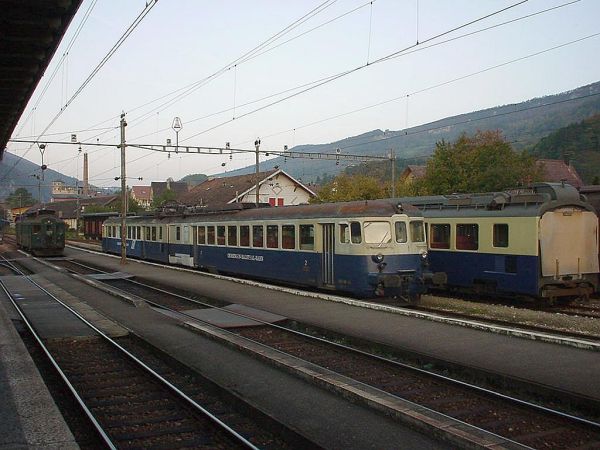
The OeBB Oensingen-Balsthal-Bahn is a very peculiar private railroad. For one thing it is a just 4 km long sidetrack, beginning
from the station of Oensingen by the federal railroads SBB's so called Jurafuss line (line by the foot of the Jura mountains).
It is important as an industrial sidetrack line. But OeBB is also one of the largest private collections of historic locomotives,
coaches and electric motor units. In addition to that, OeBB runs scheduled passenger services every half an hour on its 4km long
line - and does that with even the first class. OeBB also offers chartered runs with historic trains including the famous
"Rote Pfeil" (red arrow) or coaches from the original 1920s Orient Express. Sometimes it feels like OeBB is more like a joke.
For example their Balsthal station has an official and very clearly maked "Park and ride" car park area - with space for
exactly three cars :-)
Currently OeBB runs its 4 km back and forth official regional train service with modernised so called NPZ or Neue Pendelzug
trains which SBB now calls Domino trains. They are rented from SBB and they carry SBB's paintings and markings. But for many,
many years OeBB used to run their passenger service with very interesting and very old trains that one couldn't find anywhere
else.
This one is an example. This two-coach electric multiple unit ABDe 4/8 no.245 is from the years 1944-45 and it ran for decades
for the BLS Lötschbergbahn, whose colours it still carries. It was taken over from BLS by OeBB in December 1991 and served running
this 4 km back and forth route until it was finally scrapped in 2005. OeBB had two of these trains, numbers 244 and 245.
Picture of OeBB ABDe 4/8 no.245 at Balsthal 20.10.2001 by Ilkka Siissalo.
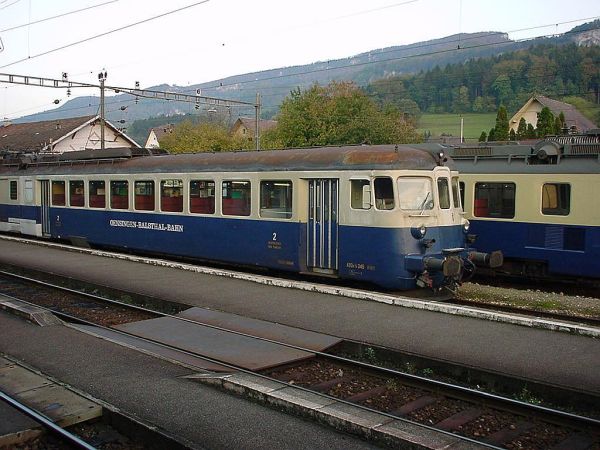
A closer look at the ABDe 4/8 no.245 electric motor unit of OeBB.
Picture from Balsthal 20.10.2001 by Ilkka Siissalo.
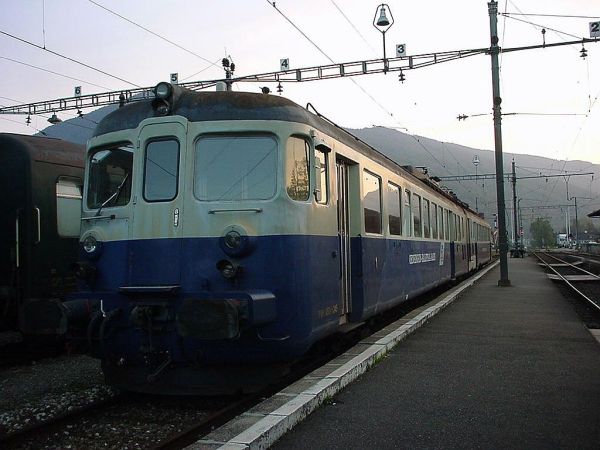
The same train ABDe 4/8 no.245 seen from one of its ends. In 1945 it has surely been a very modern train.
Picture from Balsthal 20.10.2001 by Ilkka Siissalo.
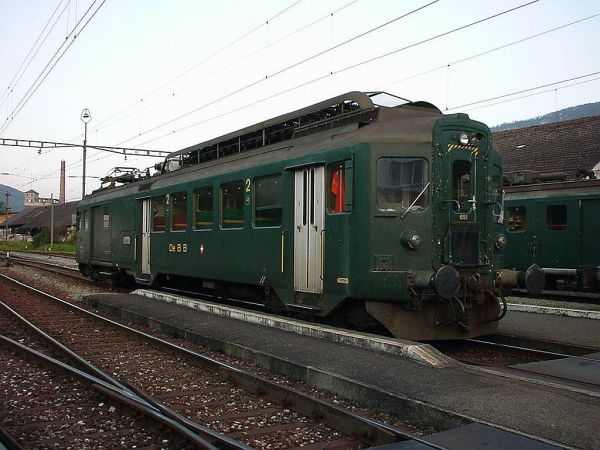
This OeBB BDe 4/4 may not be beautiful, but it is historically quite important. Its history goes back to the days of
the second world war. Switzerland was surrounded by the war and it was impossible to get enough coal for steam locomotives.
This meant that even the less frequented sidelines had to be very quickly electrified. There was also a remarkable shortage
of electric locomotives. This electric motor wagon was designed to solve the problem for sidelines. It was essentially a
copy of the newest and finest locomotive of that time, the Re 4/4 I off SBB, but now elongated to become a motorwagon with
a part of it used as a cargo and luggage wagon. Technically it very much resembles the Re 4/4 I and it has a lot of the
same components. SBB got the first ones of these in 1949 and more were ordered in 1952 so that the total amount was 31 units.
There were also matching driver's cab trailer coaches and these motor wagons could also use the newest passenger coaches of
the classes EW I and EW II (Einheitswagen I/II, standard "unity" wagons) as their middle coaches, so that three or four
wagons long push-pull trains could be formed. Only three of these historically important motor wagons have survived. SBB took
all of them out of use and scrapped all but three in 1995 to 1997. One was left at SBB Historic. OeBB bought in 1997 two of
them and used them mainly as locomotives for hauling cargo wagons for the local industry in Balsthal, but also occasionally
as passenger trains for the 4 km long line from Oensingen to Balsthal. OeBB sold its two BDe 4/4 motorwagons in 2013 to the
association Verein Depot und Schienenfahrzeuge Koblenz (DSF) in Koblenz, Germany.
Picture from Balsthal 20.10.2001 by Ilkka Siissalo.
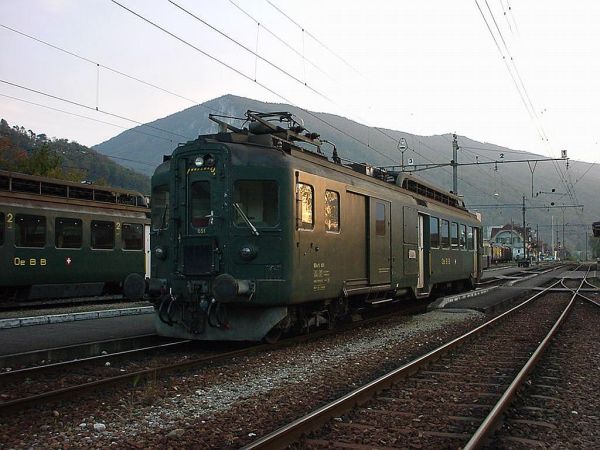
The same OeBB BDe 4/4 no.651 as above, but now seen from the other end where the cargo and luggage department was located.
Picture from Balsthal 20.10.2001 by Ilkka Siissalo.
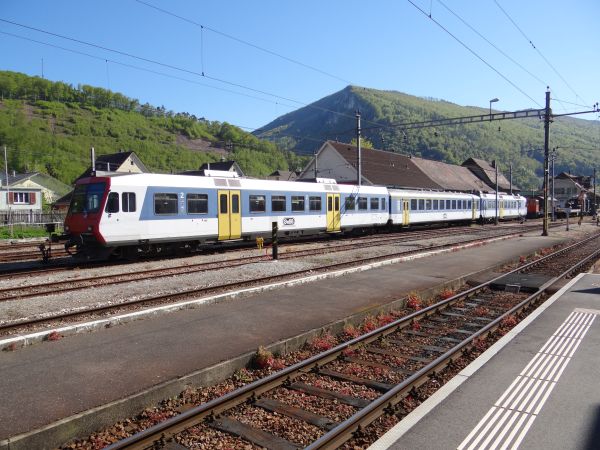
After the two blue and white formerly BLS trains, one of which is shown above, there were frequent changes in the trains used
for OeBB's regular passenger traffic. For a while OeBB had two old RBe 540 electric motor wagons with a middle coach and a
steering cab wagon. They were taken over from SBB in 2005-2006, but their use lasted only for two years. Then came this so
called NPZ train "Neue Pendelzug" RBDe 560, unmodernised. It was taken over from SBB in 2008. It had a type EW I middle coach.
OeBB modified it lightly, for example removed first class, but left it otherwise in SBB's original paintings.
Picture of OeBB's RBDe 560 from Balsthal 5.5.2016 by Ilkka Siissalo.
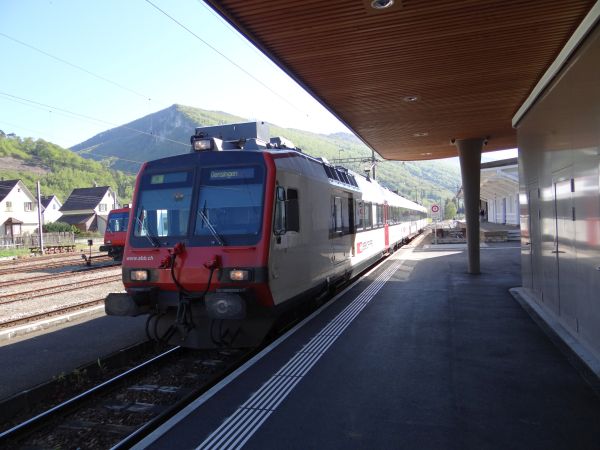
These are the trains that today run OeBB's passenger traffic. They are basically the same NPZ trains like the one shown above,
but SBB has thoroughly modernised them, they have now totally new, low-floor middle coaches and airconditioning. SBB calls these now
Domino trains. First OeBB rented from SBB one Domino and used it as a pair with the unmodernised NPZ that they had. This picture is
from those days. By then the Domino train was always one and the same. But a new law in Switzerland says that passenger trains
should be reachable even with a wheelchair, so they need to have at least a partial low-floor area. Therefore the unmodernised
NPZ is no longer used and OeBB rents two Domino trains from SBB. They come from an SBB pool in the city of Biel, so the
individual trains vary.
Picture from Balsthal 5.5.2016 by Ilkka Siissalo. In the background on the left the still unmodernised NPZ train.
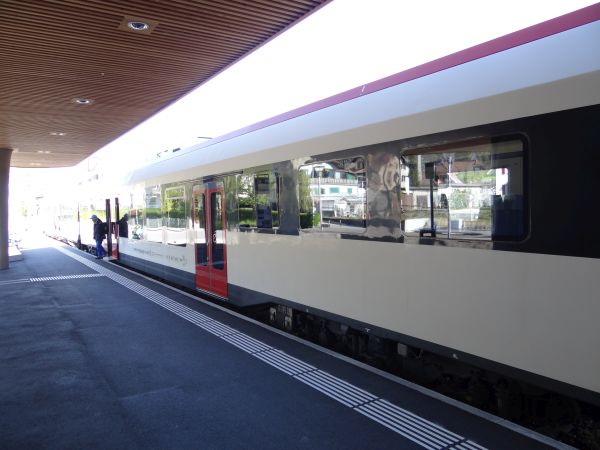
This is the new low-floor middle coach of the Domino train.
Picture from Balsthal 5.5.2016 by Ilkka Siissalo.
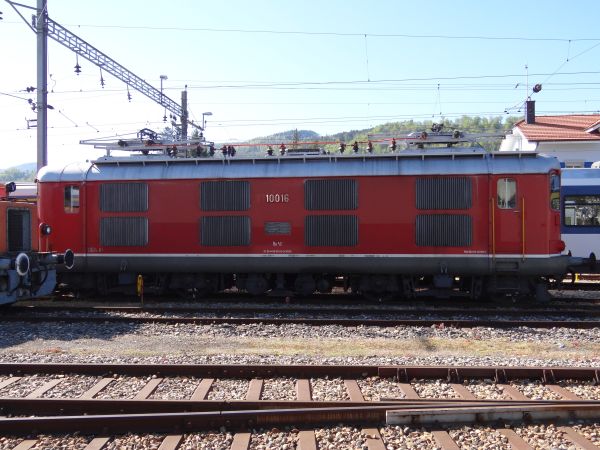
A historically valuable type Re 4/4 I locomotive from the 1940s, in a very good shape.
Picture from Balsthal 5.5.2016 by Ilkka Siissalo.
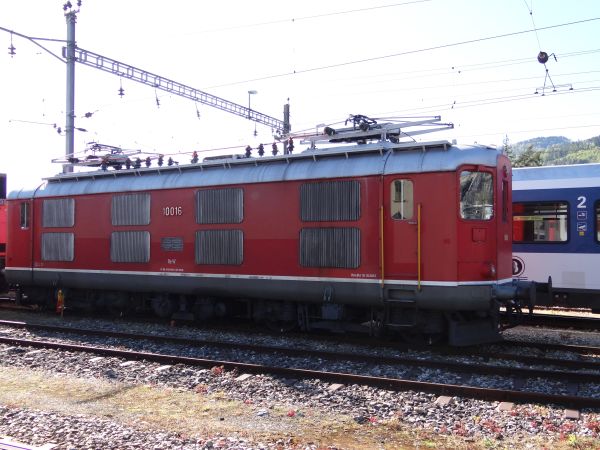
Another view of the same Re 4/4 I locomotive no 10016.
Picture from Balsthal 5.5.2016 by Ilkka Siissalo.
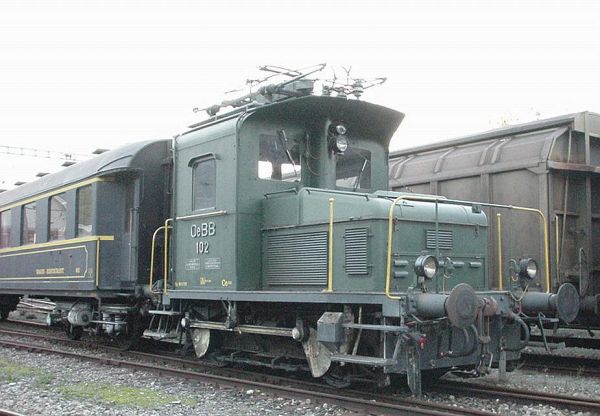
This very old electric shunting locomotive Ce 2/2 no.102 was used by OeBB mainly in shunting works at the Balsthal station,
but they have been used also for moving cargo wagons between the SBB main line at Oensingen and the local factories at Balsthal.
OeBB has two of these small locomotives, numbered 102 and 103. They were delivered to OeBB as new at the time when OeBB's
4 km line was electrified in 1944 (first one, second one came in 1947). Today they are used only in shunting at the Balsthal
depot and station area - maybe not anymore even for that (?).
Picture from Balsthal 20.10.2001 by Ilkka Siissalo.
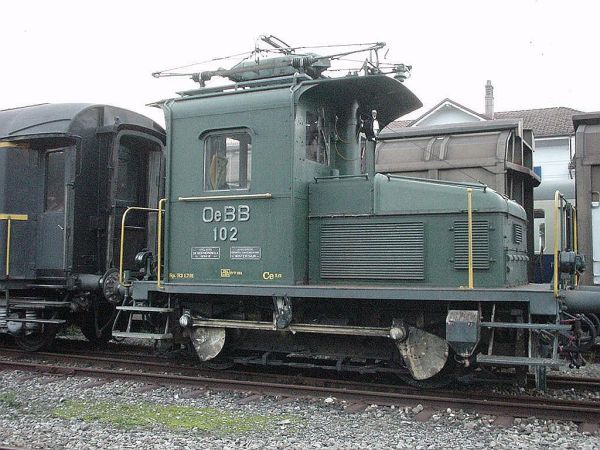
Side view of the same Ce 2/2 no.102 small locomotive.
Picture from Balsthal 20.10.2001 by Ilkka Siissalo.
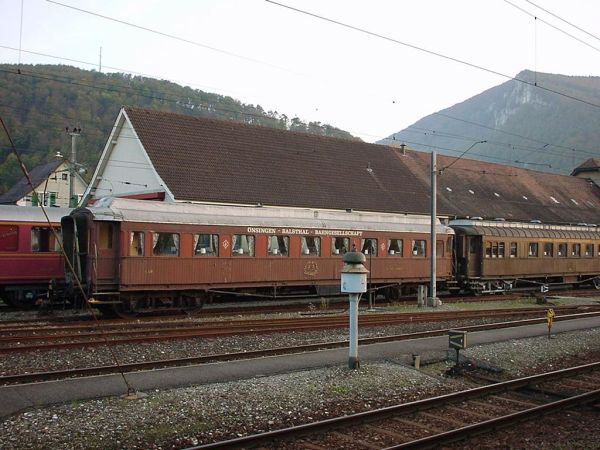
OeBB owns a number of the original international Orient Express' coaches from the 1920s and 1910s and they have together
with the local very active railway historic club of Balsthal renovated several of them, now forming a luxurious 1920s style
Orient Express train which can be rented for chartered rides, sometimes even outside of Switzerland. Here are some of the
coaches of the Orient Express.
Picture from Balsthal 20.10.2001 by Ilkka Siissalo.
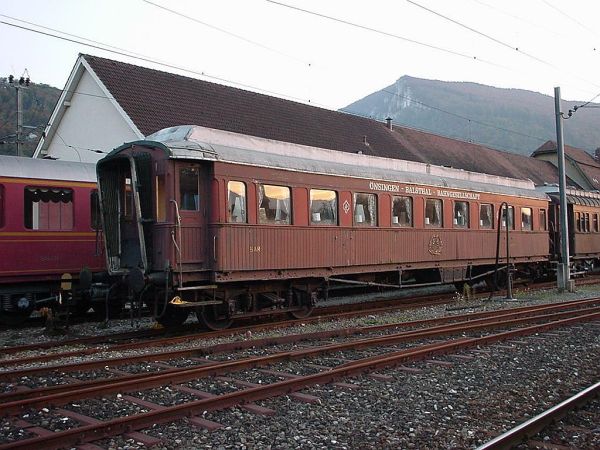
Another view of a bar wagon of OeBB's Orient Express charter train.
Picture from Balsthal 20.10.2001 by Ilkka Siissalo.
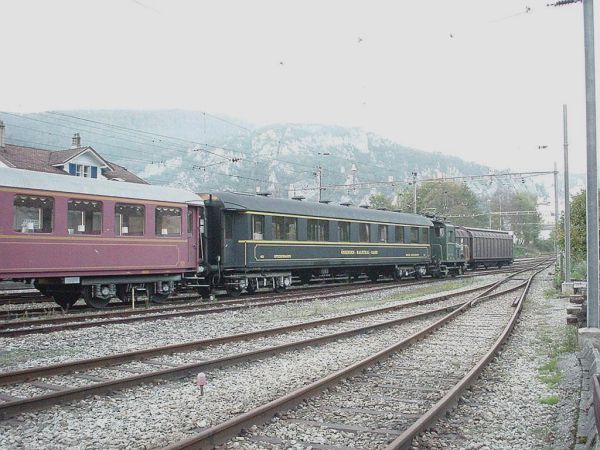
Some of the other of OeBB's Orient Express charter train coaches attached to the small Ce 2/2 no.102 locomotive.
OeBB's Orient Express train is so long that it has to be split into several parts to be able to fit it at the fiddle
yard of the Balsthal station.
Picture from Balsthal 20.10.2001 by Ilkka Siissalo.
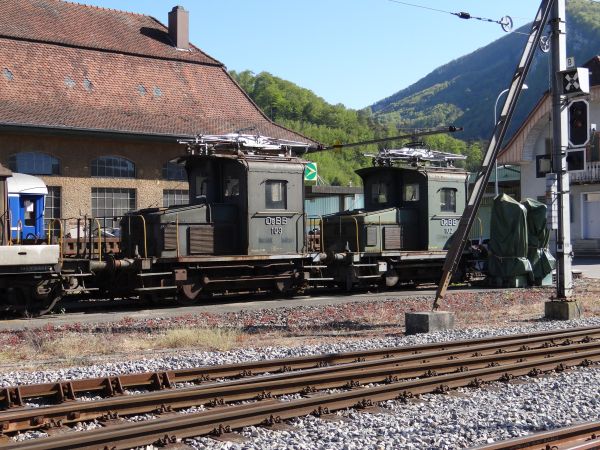
In 2016 both of the oldies Ce 2/2 no 102 and 103 had been sidetracked and it looked like they hadn't been any more used
for awhile. They were not even under a catenary wire.
Picture from Balsthal 5.5.2016 by Ilkka Siissalo.
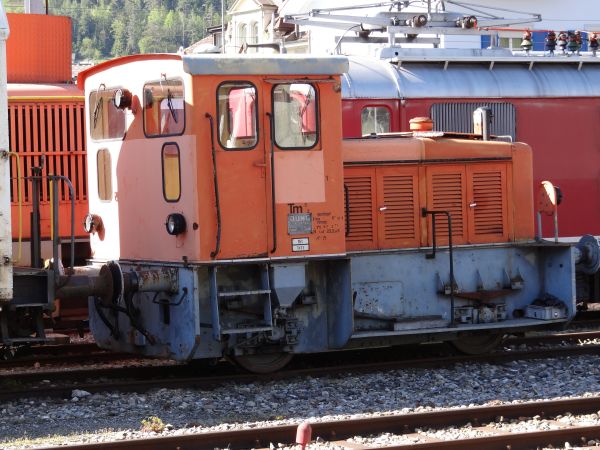
This Tm 2/2 industrial locomotive was built by the company Jung in 1966. It is used by OeBB for shunting of wagons to
unelectrified industrial rails.
Picture from Balsthal 5.5.2016 by Ilkka Siissalo.
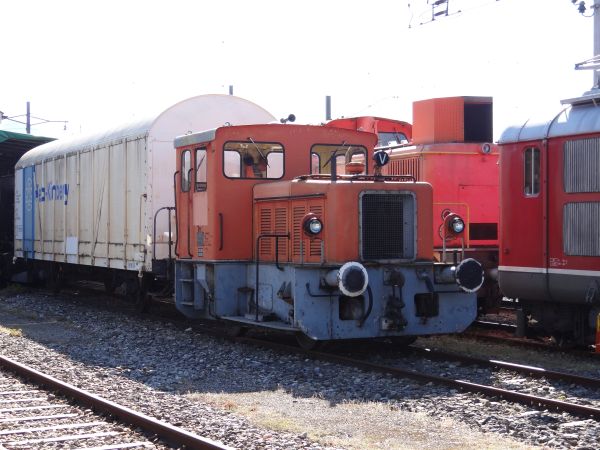
The same small Tm 2/2 industrial locomotive seen from its front.
Picture from Balsthal 5.5.2016 by Ilkka Siissalo.
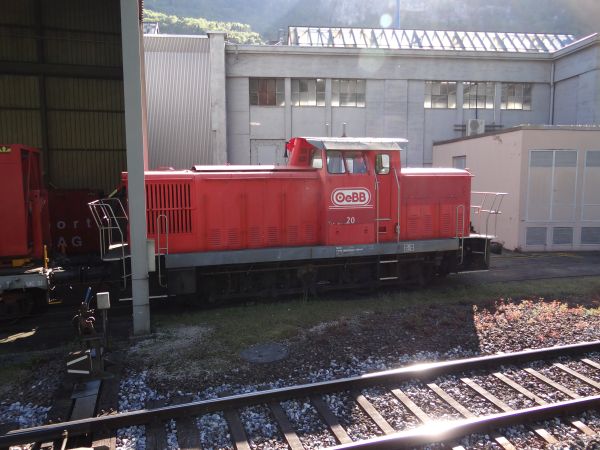
OeBB's diesel shunter now marked as Em 4/4 no.20 is originally from communist East Germany. It is one of the East German
DR's V60 or class Br 106 locomotives which were built 1962 to 1982 in East Germany (DDR). OeBB uses this machine especially
for moving garbage wagons. There is a large facility for sorting and burning community waste along the OeBB line and this
shunter machine typically moves the smelling cargoes.
Picture from Oensingen 5.5.2016 by Ilkka Siissalo.
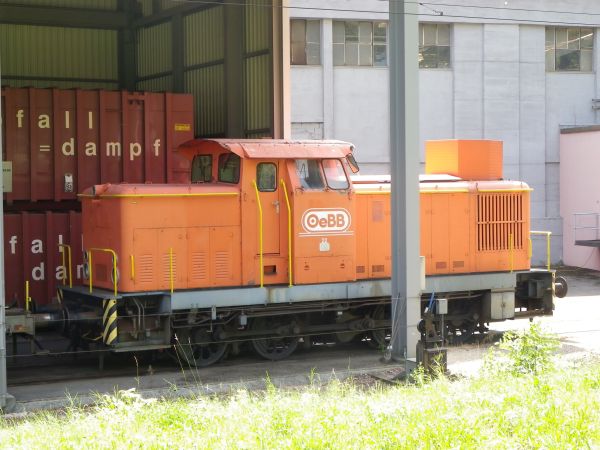
This no.22 is another former V60 diesel from what used to be communist East Germany DDR. It has even been kept in communist
East German state railways DR's orange colours.
Picture from Oensingen 10.7.2010 by Ilkka Siissalo.
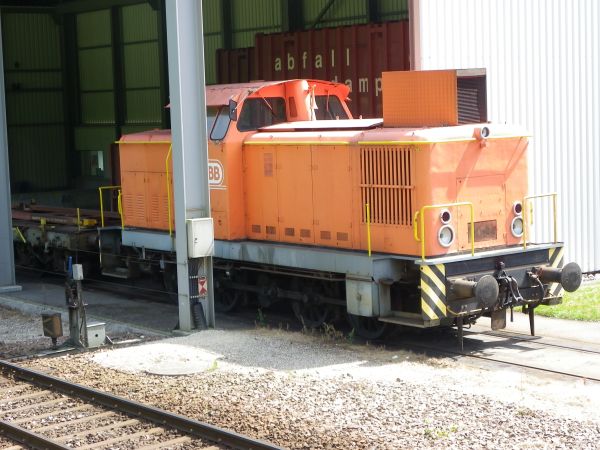
Another view of the same former East German V60 machine as above. Note the box-like extra cooler that has been added "on top of
its long nose". Since OeBB's whole network is quite short and operating speeds are quite low, these machines had a tendency to
overheat.
Picture from Oensingen 10.7.2010 by Ilkka Siissalo.
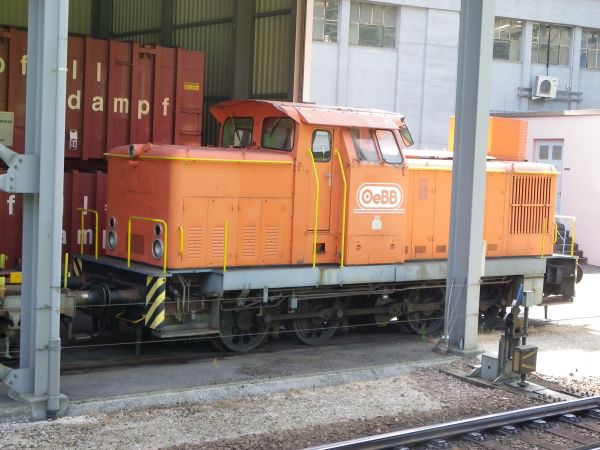
Still a third picture of the same locomotive as above. Note that the stairs had been dismantled from both ends of the locomotive
on this side. Most likely this had been done to discourage staff to jump down or climb up into the locomotive from this side.
In Switzerland train traffic runs on the left hand side and often doors are removed or other physical hinders have been created
to stop people from going in and out on the wrong side.
Picture from Oensingen 10.7.2010 by Ilkka Siissalo.
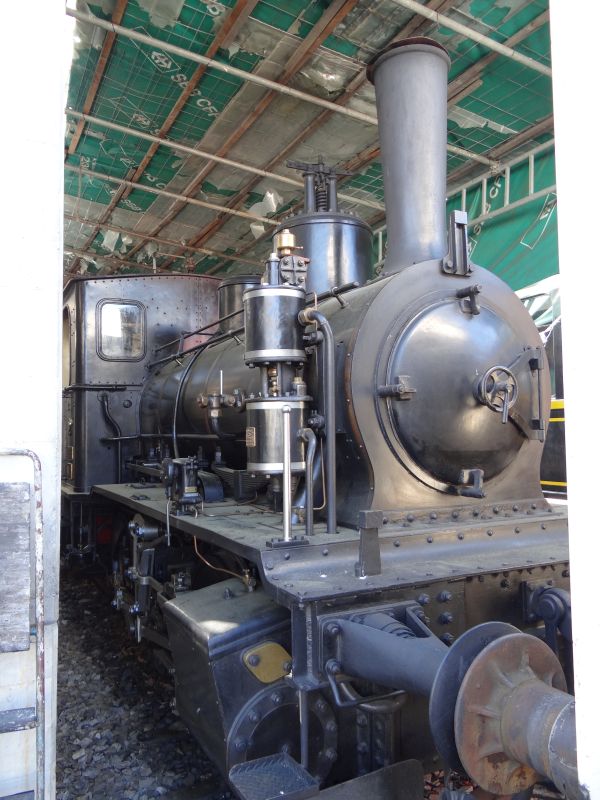
OeBB has or has had altogether five different small steam locomotives of the type E 3/3. Two have been kept in working
order by taking spare parts of the scrapped ones. These locomotives were all from the years 1899 to 1910. The two
working ones are often now seen together with some of the 1920s Orient Express coaches to form charter trains. These
E 3/3 are so small and weak that both two have to be used to be able to move the Orient Express.
Picture from Balsthal 5.5.2016 by Ilkka Siissalo.
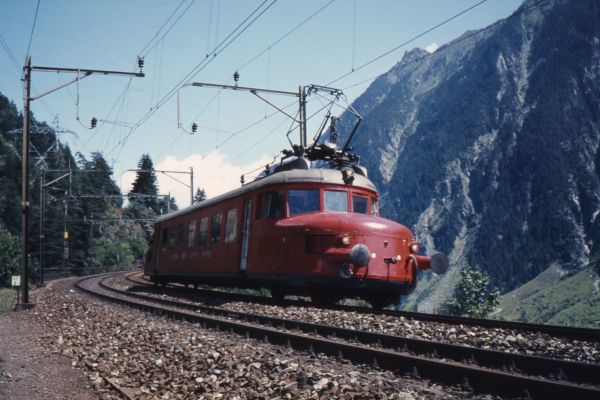
Probably the most famous of OeBB's historic trains has been the RAe 2/4 "Roter Pfeil", red arrow. This red arrow on the picture
is not exactly the same one, but it is similar. This one is owned by SBB Historic and it has here been photographed by the
Wikimedia Commons user "Peter elektro". This picture is from Wassen 28.7.1981 and it is published at Wikimedia under the
Creative Commons Attribution-Share Alike 3.0 Unported license,
which allows us to reproduce it.
Due to copyright issues we had no opportunity to publish here pictures of the same red arrow which OeBB has. Besides, that motor
wagon has suffered from a serious engine failure and cannot be photographed right now. OeBB's arrow was first blue. It was built
in 1938 and OeBB bought it in 1974. For years it was blue, but has now again been painted in its original red colours.
Eisenbahn-Klub Balsthal - Railway club of Balsthal
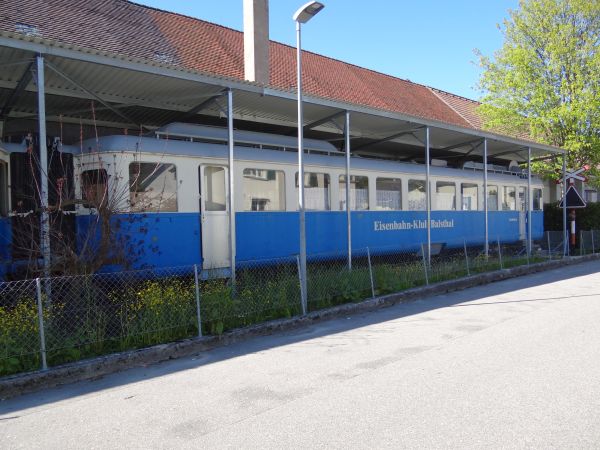
There is a very active railway club, Eisenbahn-Klub Balsthal, which both repairs old, historic locomotives and coaches but
also has a fairly large model railroad. Their "Klublokal" consists of two of formerly BLS' coaches. One of them contains
the model railroad layout.
Picture from Balsthal 5.5.2016 by Ilkka Siissalo.
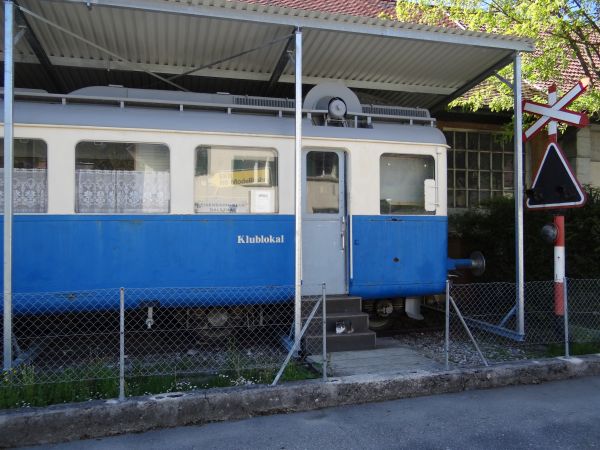
A detail picture of the entrance to the club's premises on two old BLS coaches...
Picture from Balsthal 5.5.2016 by Ilkka Siissalo.
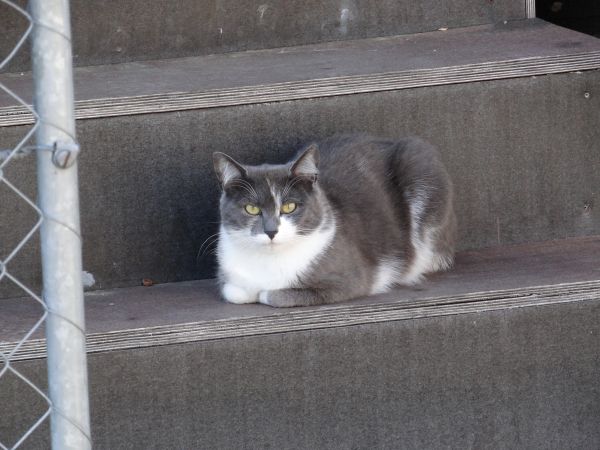
...but foreign visitors had absolutely no access to the "Klublokal". That was taken care by the club's fierce cat :-)
Picture from Balsthal 5.5.2016 by Ilkka Siissalo.

